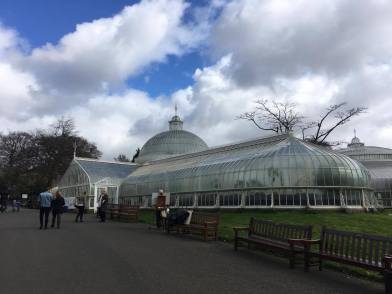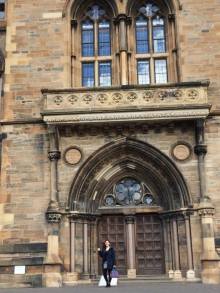
Thanks to the generous support of the Scottish Graduate School of Arts and Humanities’ (SCSAH) Small Award (Cohort Development Fund), I was very happy to participate in the two-day international conference “Other Psychotherapies – Across Time, Space, and Cultures”, which was held at the University of Glasgow on the 3rd and the 4th of April 2017. As a Greek doctoral researcher studying at the University of Edinburgh, I have never had thus far the chance to visit Glasgow, one of the largest and certainly most enchanting cities in the United Kingdom. Therefore, by virtue of the kind support from the SGSAH, I was able to arrive one day early and had the wonderful opportunity to visit (on a surprisingly sunny day!) the astonishing Botanic Gardens, the Hunterian Museum, the Kelvingrove Art Gallery and Museum, the Glasgow Cathedral and the stunning Necropolis.
The conference itself took place in one of the most architecturally inspiring and modern buildings of the University of Glasgow, the Wolfson Medical Building, which is situated in the West End, where “the heart of Glasgow’s uni life” really beats. This event, highly interdisciplinary by its very nature, brought together anthropologists, classicists, human geographers, modern historians, psychologists, psychotherapists, philosophers and social scientists, among others, in order to explore together how different cultures, separated by time and space, have dealt with an issue that has troubled almost all peoples on earth: the therapy of the troubled soul.

The Conference Venue
Without doubt, I have been greatly benefited by this immensely successful academic event for several reasons, not only professional, but also personal. First of all, I myself gave a paper entitled “Platonic Philosophy as a Form of Psychotherapy: The Case of Plato’s Symposium,” thus exploring the potential similarities between Plato’s erotic philosophy and modern psychotherapeutic techniques. Not only the process of writing and presenting this paper in front of a diverse audience, coming from different disciplines, but also the lively discussion generated by it was of significant assistance to me and my research in general.

My Presentation (picture courtesy of Mark Huggins)
Furthermore, as a classicist myself, I was able to meet in person and discuss various issues both with graduate students and well-known researchers in my field, such as (in alphabetic order) Dr. Petros Bouras-Vallianatos (King’s College London), Professor Sophie Mills (University of North Carolina), Dr. Georgia Mouroutsou (Western University Canada), Dr. Peter Singer (Birkbeck, University of London), Dr. Chiara Thumiger (University of Warwick), and Dr. Sofia Xenofontos (University of Glasgow).
Last but not least, I must admit that the attendance of this conference has additionally been beneficial to me on a deeper, more personal level. Thanks to this event, I had the unique and rare opportunity to come into contact with different approaches towards the therapies of the human soul, as have been practiced in ancient Greece, India, China, Canada and South Africa. This fact has truly prompted me to re-examine and think critically not only upon the way I approach my work as a PhD student, but also my life in general. Consequently, I would like to wholeheartedly thank both the conference organisers and the SGSAH team who have provided me with this very constructive experience!



